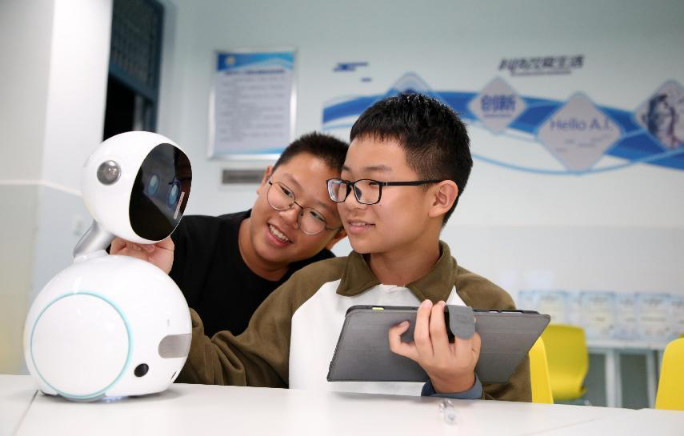By He Yin, People's Daily

Students control a robot with a tablet in an artificial intelligence class in a middle school in Hefei, east China's Anhui province, Oct. 10, 2023. (Photo by Fu Jun/People's Daily Online)
Chinese President Xi Jinping announced that China will put forward the Global Initiative for Artificial Intelligence (AI) Governance in his keynote speech at the opening ceremony of the third Belt and Road Forum for International Cooperation, demonstrating China's leading role in global AI governance.
In recent years, AI technology has advanced rapidly with increasingly wider applications. As one of the most disruptive emerging technologies, AI has brought tremendous dividends to socio-economic development, but it is also accompanied by risks and challenges.
The international community has been highly concerned about the legal, ethical, and humanitarian aspects triggered by this technology, as well as the complex and far-reaching impacts it has brought on international politics, economy, military, and society.
In the face of the unpredictable risks and complicated challenges posed by AI, the international community urgently needs to strengthen AI governance, capitalizing on strengths and avoiding shortcomings, avoiding harm, so as to steer the development of AI in a positive direction.
As UN Secretary-General Antonio Guterres pointed out, the world needs to "approach this technology with a sense of urgency, a global lens, and a learner's mindset." Countries should coordinate efforts, set boundaries, and work tirelessly to promote AI for the benefit of humanity.
As a responsible AI power, China has always attached great importance to the governance of AI. China insists on the equal emphasis on development and security, and continuously strengthens research on AI-related legal, ethical, moral, and social issues.
Guided by the principles of prudence, inclusiveness, and adherence to bottom lines, China is gradually establishing and improving relevant laws, regulations and institutional systems to ensure the healthy, orderly, and secure development of AI. The country aims to provide strong support for and inject positive energy into the global development of AI.
The Global Initiative for AI Governance clearly outlines China's proposals on the development, security and governance of AI. It adopts a systematic approach that emphasizes both development and security, upholds a people-centered approach in developing AI, adheres to the principle of developing AI for good, and upholds the principles of mutual respect, equality, and mutual benefit in AI development.
The initiative opposes drawing ideological lines or forming exclusive groups to obstruct other countries from developing AI. It calls for efforts to bridge the AI divide and ensure that the AI dividend benefits all nations, making the development of AI beneficial for human civilization.
The initiative emphasizes the importance of security, controllability, privacy protection, fairness, and non-discrimination. It reflects the main concerns of all parties regarding AI security and proposes specific goals and measures such as joint governance and intelligent governance.
These actions are not only in line with the needs of technological development but also help prevent and resolve potential security risks. The initiative aims to ensure that AI technology truly contributes to global development and empowers the better life of humankind.
The initiative calls for increasing the representation and voice of developing countries in global AI governance, and ensuring equal rights, equal opportunities, and equal rules for all countries in AI development and governance. It says efforts should be made to conduct international cooperation with and provide assistance to developing countries, and develop AI governance frameworks, norms and standards based on broad consensus with full respect for differences in policies and practices among countries.
This initiative represents a strong voice from developing countries calling for equal opportunities, and demonstrates China's role as a responsible major country in improving global governance.
The initiative provides constructive solutions to the widely concerned issues of AI development and governance, providing a blueprint for relevant international discussions and rule-making. It is another action taken by China to contribute to building a community with a shared future for mankind, and to implement the Global Development Initiative, the Global Security Initiative, and the Global Civilization Initiative.
In comparison to the deliberate policies of some Western countries that create "small yard and high fence" and foster an AI divide, this initiative reflects China's mature experience in AI governance, demonstrating China's broad-mindedness and unselfishness as a major power.
At a crucial juncture of global AI governance, the China-proposed initiative will effectively build consensus through dialogue and cooperation, and develop open, fair, and efficient governing mechanisms, in a bid to promote AI technologies to benefit humanity.
In recent years, AI technology has advanced rapidly with increasingly wider applications. As one of the most disruptive emerging technologies, AI has brought tremendous dividends to socio-economic development, but it is also accompanied by risks and challenges.
The international community has been highly concerned about the legal, ethical, and humanitarian aspects triggered by this technology, as well as the complex and far-reaching impacts it has brought on international politics, economy, military, and society.
In the face of the unpredictable risks and complicated challenges posed by AI, the international community urgently needs to strengthen AI governance, capitalizing on strengths and avoiding shortcomings, avoiding harm, so as to steer the development of AI in a positive direction.
As UN Secretary-General Antonio Guterres pointed out, the world needs to "approach this technology with a sense of urgency, a global lens, and a learner's mindset." Countries should coordinate efforts, set boundaries, and work tirelessly to promote AI for the benefit of humanity.
As a responsible AI power, China has always attached great importance to the governance of AI. China insists on the equal emphasis on development and security, and continuously strengthens research on AI-related legal, ethical, moral, and social issues.
Guided by the principles of prudence, inclusiveness, and adherence to bottom lines, China is gradually establishing and improving relevant laws, regulations and institutional systems to ensure the healthy, orderly, and secure development of AI. The country aims to provide strong support for and inject positive energy into the global development of AI.
The Global Initiative for AI Governance clearly outlines China's proposals on the development, security and governance of AI. It adopts a systematic approach that emphasizes both development and security, upholds a people-centered approach in developing AI, adheres to the principle of developing AI for good, and upholds the principles of mutual respect, equality, and mutual benefit in AI development.
The initiative opposes drawing ideological lines or forming exclusive groups to obstruct other countries from developing AI. It calls for efforts to bridge the AI divide and ensure that the AI dividend benefits all nations, making the development of AI beneficial for human civilization.
The initiative emphasizes the importance of security, controllability, privacy protection, fairness, and non-discrimination. It reflects the main concerns of all parties regarding AI security and proposes specific goals and measures such as joint governance and intelligent governance.
These actions are not only in line with the needs of technological development but also help prevent and resolve potential security risks. The initiative aims to ensure that AI technology truly contributes to global development and empowers the better life of humankind.
The initiative calls for increasing the representation and voice of developing countries in global AI governance, and ensuring equal rights, equal opportunities, and equal rules for all countries in AI development and governance. It says efforts should be made to conduct international cooperation with and provide assistance to developing countries, and develop AI governance frameworks, norms and standards based on broad consensus with full respect for differences in policies and practices among countries.
This initiative represents a strong voice from developing countries calling for equal opportunities, and demonstrates China's role as a responsible major country in improving global governance.
The initiative provides constructive solutions to the widely concerned issues of AI development and governance, providing a blueprint for relevant international discussions and rule-making. It is another action taken by China to contribute to building a community with a shared future for mankind, and to implement the Global Development Initiative, the Global Security Initiative, and the Global Civilization Initiative.
In comparison to the deliberate policies of some Western countries that create "small yard and high fence" and foster an AI divide, this initiative reflects China's mature experience in AI governance, demonstrating China's broad-mindedness and unselfishness as a major power.
At a crucial juncture of global AI governance, the China-proposed initiative will effectively build consensus through dialogue and cooperation, and develop open, fair, and efficient governing mechanisms, in a bid to promote AI technologies to benefit humanity.
 Menu
Menu
 China voices to lead global AI governance
China voices to lead global AI governance
















